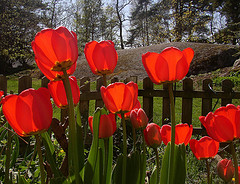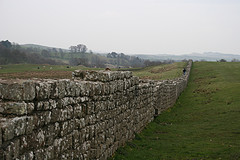Solved exercises
Topic 4 deals with the passive voice in English. You are only going to study the simple present and the simple past tenses in passive. These exercises will help you understand the changes in a sentence when it changes from the active to the passive voice. In addition there is an exercise about mass media vocabulary.
1) Passive voice is used when the focus is on the action.
2) Passive sentences can never have two objects.
3) Passive voice is used when the focus is on the person who does the action.
4) The Passive voice is commonly used in the written press.
5) Sometimes a statement in passive is more polite than in active voice.
6) Passive sentences can have two objects.
 |
| By Per Ola Wiberg. Creative Commons. |
1) They make lots of movies in India.
2) Those students speak English well.
3) He takes a lot of pictures.
4) The teacher helps the students.
5) My parents water the flowers every day in summer.
1) The Romans planted oranges in Valencia.
2) The police arrested the thieves.
3) We won the most important match of the season in the last minute.
4) My neighbour's dog bit the little child.
5) Shakespeare wrote lots of plays.
 |
| By zoonabar. Creative Commons. |
- In the year 122 AD, the Roman Emperor Hadrian (visit) __________ his provinces in Britain.
- On his visit, the Roman soldiers (tell) __________ him that Pictish tribes from Britain's north (attack) __________ them.
- So Hadrian (give) __________ the order to build a protective wall across one of the narrowest parts of the country.
- After 6 years of hard work, the Wall (finish) __________ in 128.
- It (be) __________ 117 kilometres long and about 4 metres high.
- The Wall (guard) __________ by 15,000 Roman soldiers.
- Every 8 kilometres there (be) __________ a large fort in which up to 1,000 soldiers (find) __________ shelter.
- The soldiers (watch) __________ over the frontier to the north and (check) __________ the people who (want) __________ to enter or leave Roman Britain.
- In order to pass through the Wall, people had to do to one of the small forts that (serve) __________ as gateways.
- Those forts (call) __________ milecastles because the distance from one fort to another (be) __________ one Roman mile (about 1,500 metres).
1. used for the first time? The credit card was used for the first time in the USA.
2. by? America was discovered by Christophjer Columbus.
3. ? Chocolate was grown by the Incas.
4. invented? Fireworks were invented in China.
5. president Kennedy ? President Kennedy was assassinated by Lee Harvey Oswald.
media / broadcasting / soap opera / documentary / weather forecast / talk show / commercial / satellite / daily newspaper
weekly newspaper / press / headlines / quality newspaper / broadsheet / tabloid / popular newspaper / supplement
*****************************************************************************************
culebrón, telenovela / anuncio, publicidad / titulares / transmisión / periódico popular, de menor calidad / prensa
periódico diario / programa de entrevistas / satélite / suplemento / periódico de mayor calidad / periódico semanal
medios de comunicación / documental / pronóstico del tiempo